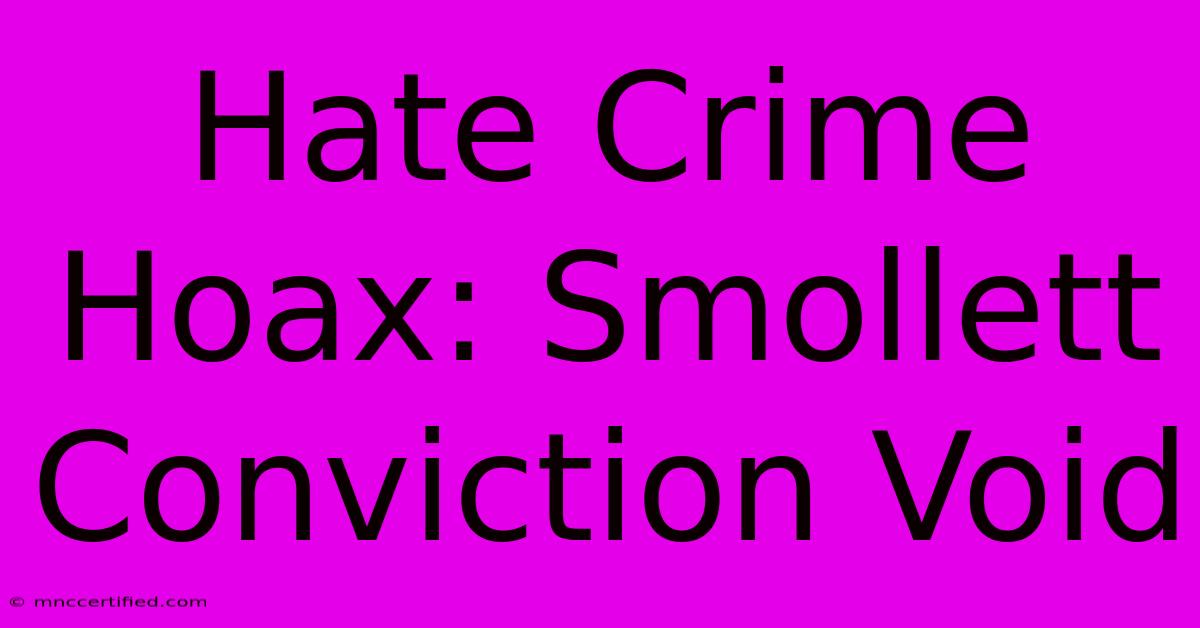Hate Crime Hoax: Smollett Conviction Void

Table of Contents
Hate Crime Hoax: Smollett Conviction Void – A Deeper Dive into the Case
The case of Jussie Smollett, the actor accused and subsequently convicted of staging a hate crime hoax, has captivated the nation and sparked intense debate. In March 2022, a judge overturned Smollett's conviction, a decision that has reignited discussions surrounding the complexities of justice, media narratives, and the serious implications of false accusations of hate crimes. This article delves into the details of the case, examining the reasons behind the overturned conviction and the broader impact of such events.
Understanding the Original Charges and Conviction
Smollett, a prominent actor known for his role in the TV series Empire, claimed he was the victim of a hate crime in January 2019. He reported being attacked by two masked men who shouted racial and homophobic slurs, placed a noose around his neck, and poured bleach on him. The incident immediately garnered national media attention, fueling outrage and sparking discussions about racism and homophobia.
However, after an extensive investigation, Chicago police determined Smollett had orchestrated the entire event. He was subsequently charged with disorderly conduct, a felony in Illinois. In December 2021, he was found guilty on five of the six counts against him. The conviction seemed to bring a degree of closure, validating the police investigation and seemingly sending a message against the misuse of hate crime accusations.
The Overturning of the Conviction: A Legal Analysis
The surprising reversal of Smollett's conviction came in March 2022. The judge, citing prosecutorial misconduct, ruled that the conviction was void. The judge argued that the special prosecutor assigned to the case had violated Smollett's rights by removing certain jurors who could've been more sympathetic to the defense. The specific actions cited by the judge focused on the seemingly arbitrary dismissal of jurors, raising concerns about the fairness of the trial process. This raises critical questions about the integrity of the judicial system and the standards required for fair trials.
The argument about prosecutorial misconduct centers on the claim that the dismissal of jurors was not based on legitimate grounds but instead on a perception of bias that wasn't fully substantiated. This led to the assertion that Smollett was denied a jury representing a fair cross-section of the community, impacting his right to a fair trial under the Sixth Amendment.
The Broader Implications and Public Perception
The Smollett case has had far-reaching implications beyond the legal realm. It sparked debates about:
-
The impact of false hate crime accusations: The case highlighted the damage false accusations can inflict on genuine victims and the erosion of trust in law enforcement and the justice system. The potential for discouraging legitimate reporting of hate crimes is a serious concern.
-
Media responsibility in reporting such incidents: The initial widespread reporting of Smollett's claims, before the truth was known, raises questions about the media's responsibility to verify information thoroughly before publishing it. The speed at which information spreads in the digital age makes responsible reporting all the more crucial.
-
The role of public opinion and social media: The case demonstrates how quickly public opinion can form and spread, often based on incomplete or biased information. Social media played a significant role in shaping public perception, both during the initial reporting of the incident and after the truth emerged.
Conclusion: Ongoing Debate and Future Considerations
The overturning of Jussie Smollett's conviction, while based on procedural grounds, leaves many lingering questions about the case's broader impact. It underscores the importance of due process, the potential for prosecutorial overreach, and the necessity of careful scrutiny in reporting allegations of hate crimes. While the legal battle may be over for now, the societal conversation around hate crimes, their reporting, and the ramifications of false accusations continues. The Smollett case serves as a stark reminder of the need for responsible reporting, fair trials, and a thorough understanding of the complexities of justice.

Thank you for visiting our website wich cover about Hate Crime Hoax: Smollett Conviction Void. We hope the information provided has been useful to you. Feel free to contact us if you have any questions or need further assistance. See you next time and dont miss to bookmark.
Featured Posts
-
Best Places To Work In Insurance
Nov 22, 2024
-
Snowflake Stock Rises On Positive Earnings Report
Nov 22, 2024
-
Temporary Bobtail Insurance Cost
Nov 22, 2024
-
Mc Caul On Icc Arrest Warrants Israel
Nov 22, 2024
-
Us Embassy In London On Lockdown
Nov 22, 2024